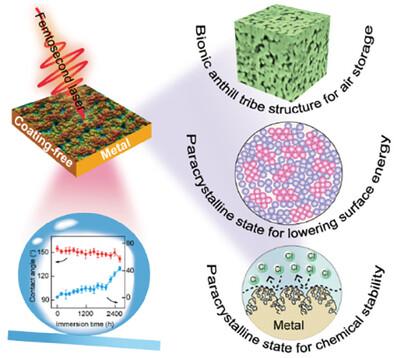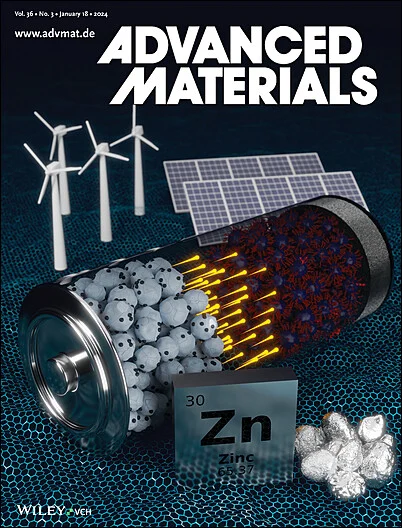Durable Organic Coating-Free Superhydrophobic Metal Surface by Paracrystalline State Formation
IF 27.4
1区 材料科学
Q1 CHEMISTRY, MULTIDISCIPLINARY
引用次数: 0
Abstract
The chemical instability of traditional organically-decorated superhydrophobic metal surfaces is a significant issue, severely limiting practical applications. This is due to the susceptibility of low surface energy coatings to ion permeation, decomposition, and exfoliation, especially in harsh environments. Here, organic coating-free, durable superhydrophobic surfaces on Al alloys by developing the paracrystalline state of a bionic anthill tribe structure is successfully achieved, using femtosecond laser element-doping microstructuring followed by repetitive annealing processes. Remarkably, the inherent superhydrophobic properties of the sample are maintained for ≈2000 h in a corrosive 3.5 wt.% NaCl aqueous solution, significantly surpassing the performance of traditional organic coatings. Moreover, this inherent superhydrophobicity remains nearly unchanged, even after rigorous electrochemical reaction measurements. Additional tests involving UV irradiation (>100 h), freezing cycles (>100 cycles), and acid/alkali resistance (>65 h) further demonstrate that the environmental adaptability of the surface far exceeds that of silane-coated surfaces. Ab initio calculations reveal that the formation of the paracrystalline state reduces surface energy and enhances chemical stability, thereby extending the durability of the superhydrophobic metal. These findings offer a powerful strategy for utilizing atomic-level structural rearrangements to design inherent superhydrophobic surfaces without the need for organic coatings.

通过副晶态形成持久的无有机涂层超疏水性金属表面
传统有机装饰超疏水金属表面的化学不稳定性是一个重大问题,严重限制了实际应用。这是由于低表面能涂层易受离子渗透、分解和剥离的影响,尤其是在恶劣的环境中。在此,我们利用飞秒激光元素掺杂微结构制造技术,随后采用重复退火工艺,通过开发仿生蚁丘部落结构的准晶态,成功地在铝合金上实现了无有机涂层的耐用超疏水表面。值得注意的是,在腐蚀性 3.5 wt.% 的氯化钠水溶液中,样品的固有超疏水性能可保持≈2000 小时,大大超过了传统有机涂层的性能。此外,即使经过严格的电化学反应测量,这种固有的超疏水性能也几乎保持不变。其他测试包括紫外线照射(100 小时)、冷冻循环(100 次)和耐酸碱性(65 小时),进一步证明了该表面的环境适应性远远超过硅烷涂层表面。Ab initio 计算显示,准结晶态的形成降低了表面能量,增强了化学稳定性,从而延长了超疏水金属的耐久性。这些发现为利用原子级结构重排设计固有超疏水性表面提供了有力的策略,而无需使用有机涂层。
本文章由计算机程序翻译,如有差异,请以英文原文为准。
求助全文
约1分钟内获得全文
求助全文
来源期刊

Advanced Materials
工程技术-材料科学:综合
CiteScore
43.00
自引率
4.10%
发文量
2182
审稿时长
2 months
期刊介绍:
Advanced Materials, one of the world's most prestigious journals and the foundation of the Advanced portfolio, is the home of choice for best-in-class materials science for more than 30 years. Following this fast-growing and interdisciplinary field, we are considering and publishing the most important discoveries on any and all materials from materials scientists, chemists, physicists, engineers as well as health and life scientists and bringing you the latest results and trends in modern materials-related research every week.
 求助内容:
求助内容: 应助结果提醒方式:
应助结果提醒方式:


